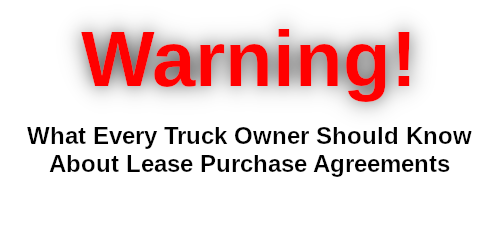
“Lease Purchase” programs sound very appealing to a driver who wants to own his truck. Most carriers that provide “Lease Purchase” programs sweeten the offer even more by making guarantees that seem to mirror those of a true “Independent Owner Operator” (those who own their truck and operate with the own FMCSA issued operating authority). Guarantees like no forced dispatch, all the time off you want, all the miles you need, drive only the lanes that you want and more. Sounds good right? The reality is that entering into a “Lease Purchase” contract is the worst option to purchase a truck.
First lets look at the company “Road Runner,” AKA “Skinny Chicken,” who offered a Lease Purchase. Road Runner enjoyed the services of approximately 1,100 Lease Purchase drivers at the time of their demise. The real tragedy isn’t that Road Runner went bankrupt. The real tragedy was the devastating impact to all the drivers who entered into a Lease Purchase contract with Road Runner. To understand the financial severity of the loss the Lease Purchase drivers suffered you need to understand how the Lease Purchase programs work.
These 4 general requirements found in most all Lease Purchase contracts are the main reasons those who sign Lease Purchase contracts fail. They are:
1. Little or no deposit required
2. Escrow terms
3. Payment amount and schedule
4. Legally obligated to only operate with the leasing companies FMCSA issued operating authority
We’ll take these on one at a time.
1. Little or no deposit required means it will take you longer to fulfill your Lease Purchase financial obligation and actually payoff and own the truck.
2. Escrow terms are included so the carrier can collect additional payments separate and above the payment amount from the Lease Purchase driver. In theory this Escrow account is for licensing, truck repairs, tires, insurance and a variety of other expenses listed by the leasing company.
3. Payment amount and schedule is the most straight forward section you will find in a Lease Purchase contract. It is simply how much your payments are and when they are due. Your payment amount can be a percentage or a set dollar amount and the schedule can be anything from weekly to bi-weekly or monthly.
4. Legally obligated to only operate with the leasing companies FMCSA issued operating authority gives the one guarantee that everyone should be extremely concerned about. It legally binds you to financially fulfill the Lease Purchase contract before you can operate under someone else’s authority or your own authority.
So what does all that mean? It means that the leasing company (the carrier) holds all the cards and you are at risk of loosing your entire investment. Take the case of Road Runner. When they went bankrupt it was without notice and immediate. All the approximately 1,100 lease purchase drivers were in the nightmare of their lives. First, they didn’t own the truck they were Lease Purchasing the bank did. So the bank repossessed all the trucks. Since Road Runner went bankrupt all their assets (property, bank accounts, etc) were locked up in litigation (court proceeding to determine which creditor would be paid how much from the Road Runner assets) for all the creditors Road Runner owed money to. That meant that all the Escrow payments that were made were also locked up in litigation. OOIDA filed a lawsuit that took about 3 years to settle but did not disclose how much of the escrow accounts would be refunded. None of the Lease Purchase drivers received a refund or partial compensation for their payments made toward the ownership of the truck. Many had made payments for years and should have been compensated accordingly. Unfortunately the legal term “Lease Purchase” means you don’t own it until the final payment is made fulfilling the Lease Purchase contract.
There are other just as alarming reasons to steer clear of Lease Purchase agreements. Since the Leasing company (or the bank they financed it through) has 100% ownership of the truck and you are legally bound to only operate under their authority they can impose one of the oldest tricks in the trucking business on the driver. They can (and many do) “Starve Them Out.” In other words they let you make your payments for 2 or 2 ½ years and then there just isn’t enough loads for you so you can make your payments and you are forced to quit because you are in default with your payments. The the Leasing company gets to start all over with the same truck with the next driver who will sign a Lease Purchase agreement. Another dishonest practice utilized by Leasing companies is all the fees they “forgot” to mention when you signed the Lease Purchase agreement. There are a wide variety of conjured fees such as admin fees, filing fees, HR fees, statement fees, parts warehousing fees, shop fees, parking fees and many more that you couldn’t hardly imagine.
There are more reasons not to enter into a Lease Purchase agreement such as high interest rates, lower priority to dispatch compared to company trucks, higher insurance costs and many more.
The bottom line is that Lease Purchase agreements are the worst possible way to attempt to buy a truck. I have never met anyone who said they successfully bought their truck through a Lease Purchase program. I have met countless who said it was the worst thing they ever did. If you ask someone who is in the middle of a Lease Purchase agreement ask if they have ever finished buying that truck. The answer will be “no.” If the answer is yes then email me the details. I’d love to hear about it and share at least one Lease Purchase success story!
